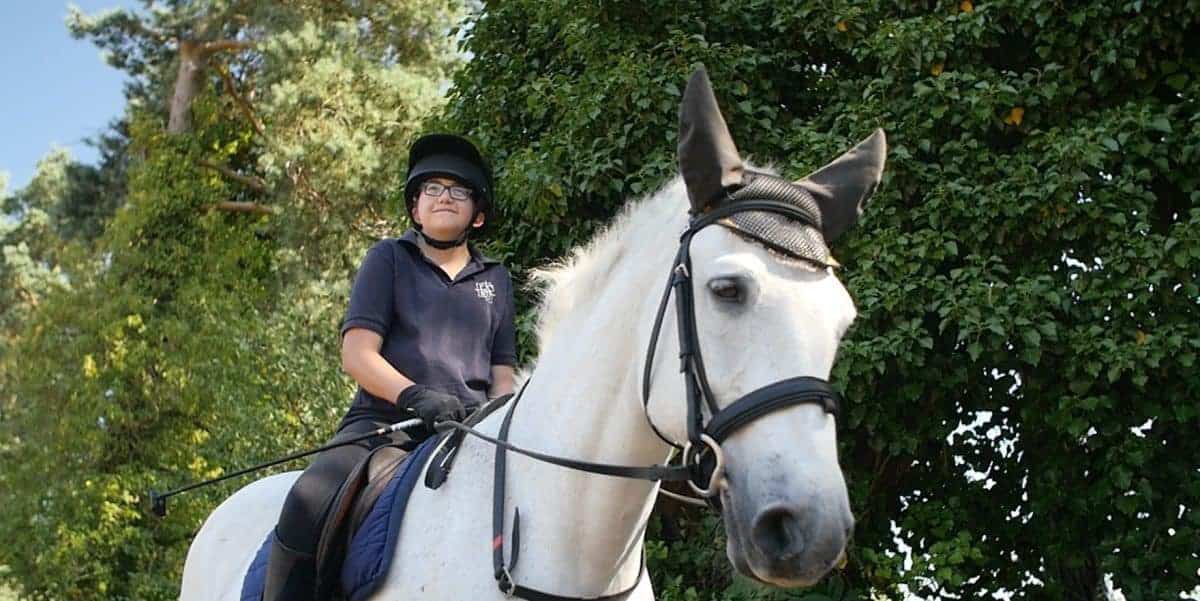How riding therapy can help young people with special needs

H&C spoke to Jennifer Dixon-Clegg, director of the Fortune Centre of Riding Therapy to find out more about riding therapy.
It was many decades ago that the benefits of riding for the disabled were recognised. Studies show that a horse’s pelvic movement mimics a humans, which provides sensory input to the brain and nervous system. However, riding not only provides physical benefits. Equine Facilitated Education and Therapy (EFET) or Equine Assisted Therapy (EAT), can also help with a wide range of mental health problems and learning disabilities.
What is EFET?
EFET is a term used for learning and development through horses. What is taught and learnt on horses can be transferred to every day life, and it helps those with special needs to live independently.
Horses provide the opportunity to learn in a way that is appropriate for a student’s mental age. It enables them to feel and experience learning, which makes it easier for them to take information on board.
Who can benefit?
It is for people who really want to be with horses – someone who only co-operates, communicates and concentrates when they are around a horse. For these people horses are a means to learning, especially for young people with learning difficulties and disabilities. Horses may be their only chance to experience any independence in adulthood.
The children don’t have to be able to ride, and they may never have even met a horse before, but they need to have shown an interest in horses, whether that is by constantly reading books or drawing pictures.
How does EFET work?
Those with special needs need to learn life skills by doing something they connect with. In EFET horses provide that connection and they can turn students who struggle in a traditional classroom environment into learners.
Every stable, tackroom, horse laundry room and arena is a classroom. The key thing is people here are motivated to learn because they want to be with horses. They communicate and they listen, because they love what they do here.
What else can students learn?
They learn everything they need to have greater control over their lives. They learn numeracy by weighing out feeds and correctly fitting a rug, and they learn literacy by learning all the horse’s names. Riding also helps with proprioception, as it improves their co-ordination and balance.
We teach them about shapes and distances, and we teach them speech and language, as horses stimulate parts of the brain involved with this. But it’s not really the staff here that teaches them – it’s all down to the horses.
What kind of problems can horses help with?
Horses can help with anything. Practice and repetition is key with so many types of therapy and horses provide a motivation to keep up that practice, without the student even realising it. There is a lot of sequencing and routine with horses, where you do the same thing day in, day out. This is really important for children with a learning disability as it helps things sink in.
Horses naturally provide occupational therapy, speech therapy, physiotherapy and aromatherapy.
What riding therapy courses do you run?
We run a three-year residential Further Education Through Horsemastership (FETH) course. The FETH Course is for people aged between 16 and 25, who have not progressed at school and whose learning needs cannot be met in their local college or school.
We also run weekly sessions during school term time for local children aged two to 12 years, who have a variety of complex physical, emotional or learning needs.
How can a student get involved?
Get in touch with the Fortune Centre of Riding Therapy, as we can answer all your questions. You can also get helpful information from the Federation of Horses in Education and Therapy International.
The key thing for all our students is they have to love horses – most people who come here are absolute beginners, but they all want to learn.
The majority of our students are government funded, and to get funding you need an Education Health and Care (EHC) plan, which states the student needs independent specialist provision. An EHC plan is a legal document, drawn up by the local authority, that describes a young person’s special educational, health and social care needs and explains the extra help that will be given.
To find out more about the Fortune Centre of Riding Therapy don’t miss Martin Clunes: Riding Therapy available to watch now on H&C Play. The show then premiers on Sky 253 on 28 March at 9pm.






